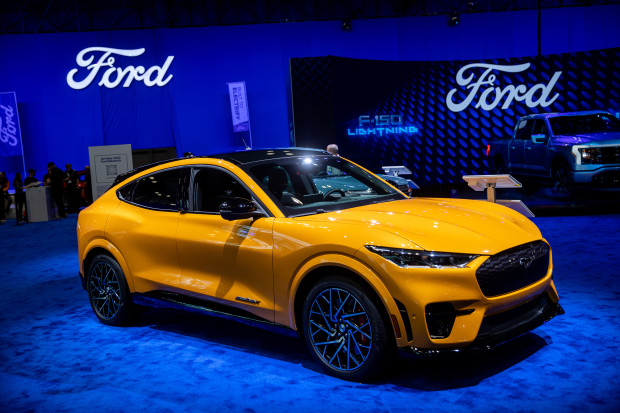
The National Highway Traffic Safety Administration (NHTSA) said Monday that the agency is currently looking into Ford's 2022 recall of 49,000 Mustang Mach-E EVs. The agency is investigating whether the fix Ford issued at the time is adequate and whether it should be expanded beyond those 49,000 impacted vehicles.
Ford (F) -) issued the recall in June last year, saying that fast charging, combined with "repeated wide-open pedal events," can cause the battery main contactors to overheat. The result could be a loss in power or an inability to start the car.
DON'T MISS: Former Ford CEO Has a Blunt Warning for the EV Industry
Ford's fix at the time was to provide software updates that monitor contactor temperature and reduce battery power to prevent damage. A secondary software update was designed to identify an overheated contactor and reduce vehicle power accordingly to prevent damage.
But those fixes might not be totally up to the task. The NHTSA received a dozen consumer complaints regarding cars that had already received the fix, prompting the agency to open a query into up to 64,000 Mach-E's.
One driver told the agency that, just days after receiving the update, their Mustang experienced another failure of its High Voltage Battery Junction Box. The car was capped at 30% power until they got to a dealership. Another driver's Mach-E shut down in the middle of a highway on-ramp not long after charging at a DC fast charge station.
Ford said that the company is "working with NHTSA to support their investigation."

Another hurdle to EV adoption
But the core of this investigation – EV battery sensitivity to fast charging – represents a "potentially bigger hurdle" to broad EV adoption, according to Jeremy Michalek, Carnegie Mellon professor of engineering and public policy.
Though the issue isn't "universal," it does reach beyond the Mustang Mach-E, Michalek said in an interview with TheStreet.
"Some battery chemistries are very robust to fast charging while others degrade very quickly. So it does depend what kind of battery the electric vehicle has in it, how sensitive it will be to fast charging," he said. "But there are batteries being used today that are sensitive to fast charging and will degrade the battery much more quickly."
EV adoption, like that of all innovative technologies, has gone in waves. Though they are gaining in popularity, adoption has yet to become broad, with consumers noting such hurdles as price, range and charging location.
Though companies and governments are working to make them more accessible, this issue of battery sensitivity to fast charging highlights a fourth, equity-driven hurdle.
"The early adopters tend to have garages and home charging and that's where most of the charging gets done. So they really only use the fast chargers when they're on a long trip," Michalek said. "But when it gets into those secondary households in the used vehicle market, there is a much higher incidence of people not having off-street parking, living in kind of dense apartments where they don't control the parking situation."
Depending on high-speed, public chargers
These secondary owners in this later stage of adoption, Michalek said, will depend on high-speed, public chargers as longer overnight charges are not a real option.
"I do worry a bit that some of the vehicles that the batteries were fine for the first owner, they may if the second owner needs a lot more fast charging, they could die much more quickly in the hands of that second owner," he said.
Michalek explained that he and other researchers have noted big differences in the sensitivity of different battery types to fast charging. Some batteries that are currently in use are highly robust to fast charging, while others -- seemingly, like the Mach-E -- are much more sensitive. It's not a question of good batteries versus bad batteries, he said, it's more a question of trade-offs.
"I'd like to see consumers be able to get more information about whether the battery that's in their vehicle is going to be one you can fast charge all the time without worrying," Michalek said, "or one that you really should minimize your fast charging because of the issues with degrading the battery."







